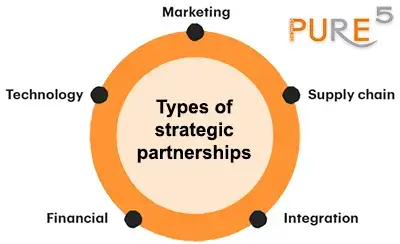Panel Discussion at ICBC 2024 Barcelona, Spain
Table of Contents
ToggleWhat are the needs for strategic partnerships?
Relationships with other companies can help you achieve even greater success when running a business. Strategic partnerships are mutually beneficial business relationships that can help your business grow at reduced costs. Understanding these partnerships can help you find the right one for expanding your reach to potential customers and clients.
A business partnership can benefit an organization in several ways, such as a more advantageous tax treatment and a more efficient division of management duties. Regardless of the size of the business and the nature of the goods or products it sells, defining the role of each business partner is crucial for the organization’s well-being. Properly setting up a partnership is essential, but it requires knowledge regarding the business and the current partnership laws.
What are strategic partnerships?
A strategic partnership is a business partnership that involves sharing resources between two or more individuals or companies to help all involved succeed. Strategic partners are usually non-competing businesses and often share the risks and rewards of both companies’ decisions.

Business partnerships are similar to personal long-term relationships in some ways, such as:
- Two or more individuals or businesses pool their funds with a common purpose in mind
- They combine their resources, skills, and knowledge for a common purpose
- They are equally responsible for the outcome of their everyday actions, which can result in a profit or a loss
What are the benefits of strategic partnerships?
Strategic partnerships offer each company involved the chance to reduce expenses and increase business. An excellent strategic partner is usually a company that either offers services you can use within your own company or that you can provide to your customers and clients while offering your services to their customers. These partnerships can expand your customer base, brand awareness, reach, and service functionality. These are mutually beneficial partnerships that can help both startups and established businesses.
What types of strategic partnerships exist?

1. Marketing partnerships
Marketing is essential to business success and growth. A strategic marketing partnership is where you and a company in a related field help each other find new customers or clients. For instance, if you own an independent transportation service, you may know someone who owns a small bed-and-breakfast. In a marketing partnership, you could each refer your clients to the other business, as there is a likelihood that many customers would need both services. Larger businesses, such as manufacturers, may find partners in companies that sell the manufactured products, agreeing to manufacture and sell products exclusively for each other.
2. Supply partnerships
Supply partnerships are the most common types of strategic partnerships. These vendors and manufacturers supply your business with the products, services, and materials your company needs. Sometimes, these are exclusive partnerships, such as giving an exclusive contract to a paper supplier for your office needs. If you own a store, you sell shelf space for vendors to sell their products, though this is often non-exclusive.
3. Supply chain partnerships
Not to be confused with supply partnerships, supply chain partnerships involve multiple companies working together to create one finished product. For instance, if your company builds automobiles, but it is more inexpensive for you to purchase some parts from another manufacturer, you may want to enter into a strategic partnership. Think of this as one large manufacturing company, where each business creates its part and ships it to the next company, where it gets added to a product. The process goes on from there until the last company finishes the product. Many supply chain partnerships are exclusive, as the finished products are often proprietary.
4. Integration partnerships
Strategic integration is all about making separate things work together. You can see this most easily in the digital landscape, where customers use social media apps to log on to various online stores and websites. Many companies also partner with payment app services to allow easy purchasing from their websites and physical storefronts. An integration partnership aims to make a customer’s daily interactions with businesses more simple, convenient, and tailored specifically to themselves. Ultimately, integration aims to make using your product so easy and helpful that it becomes a part of your customers’ daily lives.
5. Technology partnerships
As the world grows more reliant on technology, ensuring your business has the resources it needs to take care of that technology can be essential. Whether partnering with a company that can fix your computers at a price that meets your budget or a cloud service that offers discounts for the space you need, finding a technology partner can help your business run smoothly and keep pace.
6. Financial partnerships
If your company isn’t in the financial market, partnering with an outside firm to handle your finances might be helpful. The benefit of hiring a financial firm to handle things like accounting is their ability and expertise to handle these matters exclusively. This is especially true if it uses valuable resources to handle these matters within your company. Financial partnerships can cover everything from accounting to stock programs to benefits plans. These can still be mutually beneficial. For instance, some companies offer their employees benefits for holding accounts at banks with whom they’ve begun a strategic partnership.
How do we establish a strategic partnership?

1. Be clear about what you need
Whether your business needs help with distribution, marketing, finances, or anything else, have a specific goal. Understanding what you hope to achieve is the only way to know you’ve succeeded. Once you know what you’re looking for, you can find a partner who can help you achieve those goals.
2. Do your research
Whether you search online, contact people in your network, or call businesses to ask a few simple questions, try to gather information on which companies could most help your business meet its goals and, just as significantly, which companies are likely to enter into a relationship with you. Find a business that needs something you provide to ensure the partnership is mutually beneficial. This way, they are more likely to offer you what your company needs in return.
3. Create a contract or agreement
Once you’ve found a company that would make a great partner and they’ve agreed to a deal, consider having an official agreement made by a legal professional. A typical strategic partnership agreement includes the following:
- A list of all companies involved
- The specific services each provides
- The particular terms agreed upon
- The duration
- The signatures of the responsible parties
When working together to create the agreement, both parties have stipulations that must be figured out before signing. This is why hiring a lawyer or other legal official is helpful. They can also help create the contract’s specific language to keep all parties happy before signing.
4. Honor the agreement and nurture the relationship
These two ideas work together to maintain the partnership as it continues. Once you’ve entered the partnership, keeping your partner’s needs in mind while you work is essential. Stay in contact with your partner, continue to give them referrals, or honor the agreement by offering your services. Since the goal is to benefit both companies, consider making sure your partner shares in the success and remains happy with the terms of the agreement. Though this is a business relationship, it’s helpful to maintain a positive personal relationship, as well. If you keep your strategic partner happy and doing your part, they may be more likely to honor their side of the agreement or even offer expanded services or discounts not in the contract.








